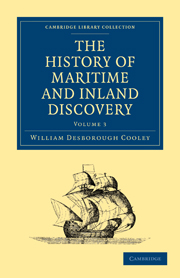Book contents
- Frontmatter
- Contents
- CHAP. I PROGRESS OF GEOGRAPHICAL SCIENCE
- CHAP. II VOYAGES OF BYRON, WALLIS, CARTERET, ETC
- CHAP. III COOK'S FIRST VOYAGE
- CHAP. IV COOK'S SECOND VOYAGE
- CHAP. V COOK'S THIRD VOYAGE
- CHAP. VI COOK'S THIRD VOYAGE CONTINUED
- CHAP. VII VOYAGE OF LA PEROUSE, ETC
- CHAP. VIII EUROPEANS IN THE SOUTH SEA
- CHAP. IX THE COASTS OF AUSTRALIA
- CHAP. X INTERIOR OF NEW HOLLAND
- CHAP. XI VANCOUVER'S VOYAGE
- CHAP. XII INTERIOR OF NORTH AMERICA
- CHAP. XIII ROSS AND PARRY
- CHAP. XIV PARRY'S VOYAGES
- CHAP. XV JOURNEY OF CAPTAIN FRANKLIN
- CHAP. XVI SECOND JOURNEY OF CAPTAIN FRANKLIN
- CHAP. XVII HUMBOLDT'S TRAVELS
- CHAP. XVIII HUMBOLDT'S TRAVELS CONTINUED
- CHAP. XIX SOUTHERN EXTREMITY OF AMERICA
- CHAP. XX EASTERN SHORES OF ASIA
- CHAP. XXI TRAVELS IN THE HIMALYEH
- CHAP. XXII BRUCE'S TRAVELS
- CHAP. XXIII PARK'S TRAVELS
- CHAP. XXIV DENHAM AND CLAPPERTON'S TRAVELS
- INDEX
CHAP. XVII - HUMBOLDT'S TRAVELS
Published online by Cambridge University Press: 05 October 2010
- Frontmatter
- Contents
- CHAP. I PROGRESS OF GEOGRAPHICAL SCIENCE
- CHAP. II VOYAGES OF BYRON, WALLIS, CARTERET, ETC
- CHAP. III COOK'S FIRST VOYAGE
- CHAP. IV COOK'S SECOND VOYAGE
- CHAP. V COOK'S THIRD VOYAGE
- CHAP. VI COOK'S THIRD VOYAGE CONTINUED
- CHAP. VII VOYAGE OF LA PEROUSE, ETC
- CHAP. VIII EUROPEANS IN THE SOUTH SEA
- CHAP. IX THE COASTS OF AUSTRALIA
- CHAP. X INTERIOR OF NEW HOLLAND
- CHAP. XI VANCOUVER'S VOYAGE
- CHAP. XII INTERIOR OF NORTH AMERICA
- CHAP. XIII ROSS AND PARRY
- CHAP. XIV PARRY'S VOYAGES
- CHAP. XV JOURNEY OF CAPTAIN FRANKLIN
- CHAP. XVI SECOND JOURNEY OF CAPTAIN FRANKLIN
- CHAP. XVII HUMBOLDT'S TRAVELS
- CHAP. XVIII HUMBOLDT'S TRAVELS CONTINUED
- CHAP. XIX SOUTHERN EXTREMITY OF AMERICA
- CHAP. XX EASTERN SHORES OF ASIA
- CHAP. XXI TRAVELS IN THE HIMALYEH
- CHAP. XXII BRUCE'S TRAVELS
- CHAP. XXIII PARK'S TRAVELS
- CHAP. XXIV DENHAM AND CLAPPERTON'S TRAVELS
- INDEX
Summary
We have seen the improvements in astronomy applied to correct the errors of geography, and, passing from the hands of the astronomer to those of the navigator, assisting to form an accurate delineation of the surface of the globe. But the relations which exist between geography and physical science in general still remained to be studied, and it was not till our own days that a traveller appeared qualified, by his ardour, his knowledge, and his talents, to enter upon so grand an undertaking. Alexander von Humboldt, the person to whom we allude, was born at Berlin, in 1769. He received his education at Göttingen and Frankfort on the Oder; he subsequently pursued his mineralogical studies at the celebrated school of Freiberg. He seems to have cultivated assiduously every branch of knowledge o but the ardour of learning naturally attached him to the pursuits that were at that time most in vogue. Chemistry and the phenomena of animal electricity chiefly attracted his attention. As he possessed an ample independent fortune, he was able to add the accomplishment of travel to that of secluded study. He visited England and Holland in company with G. Forster and Van Geuns. Italy and Switzerland he visited with Von Hafter and Freiesleben. The conversation of these men determined the predilection which young Humboldt already evinced for the stvuly of nature. In 1797 he went from Vienna with his brother William von Humboldt, a man of eminent learning and abilities, to Paris, where he formed an acquaintance with Aimé Bonpland, a young botanist of distinguished merit, with whom he concerted various plans of travel.
- Type
- Chapter
- Information
- The History of Maritime and Inland Discovery , pp. 248 - 261Publisher: Cambridge University PressPrint publication year: 2010First published in: 1831



